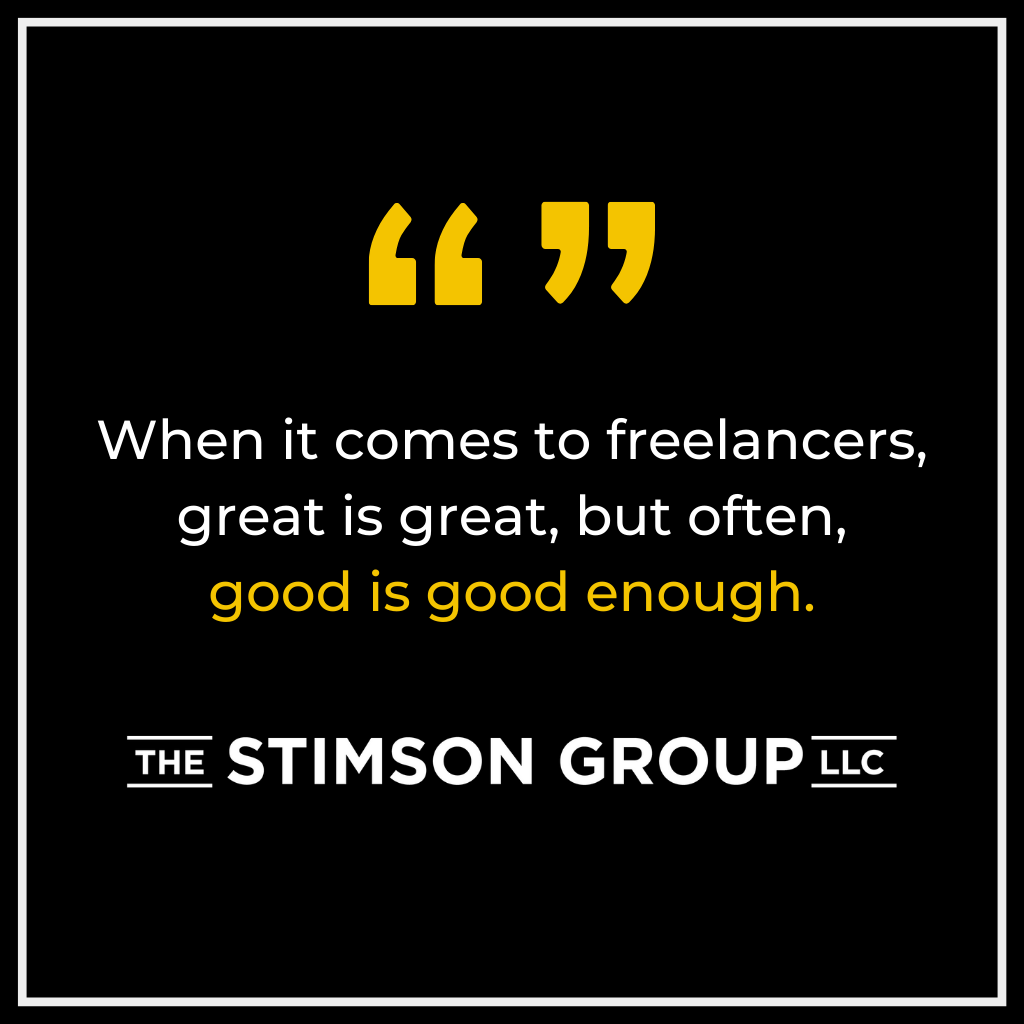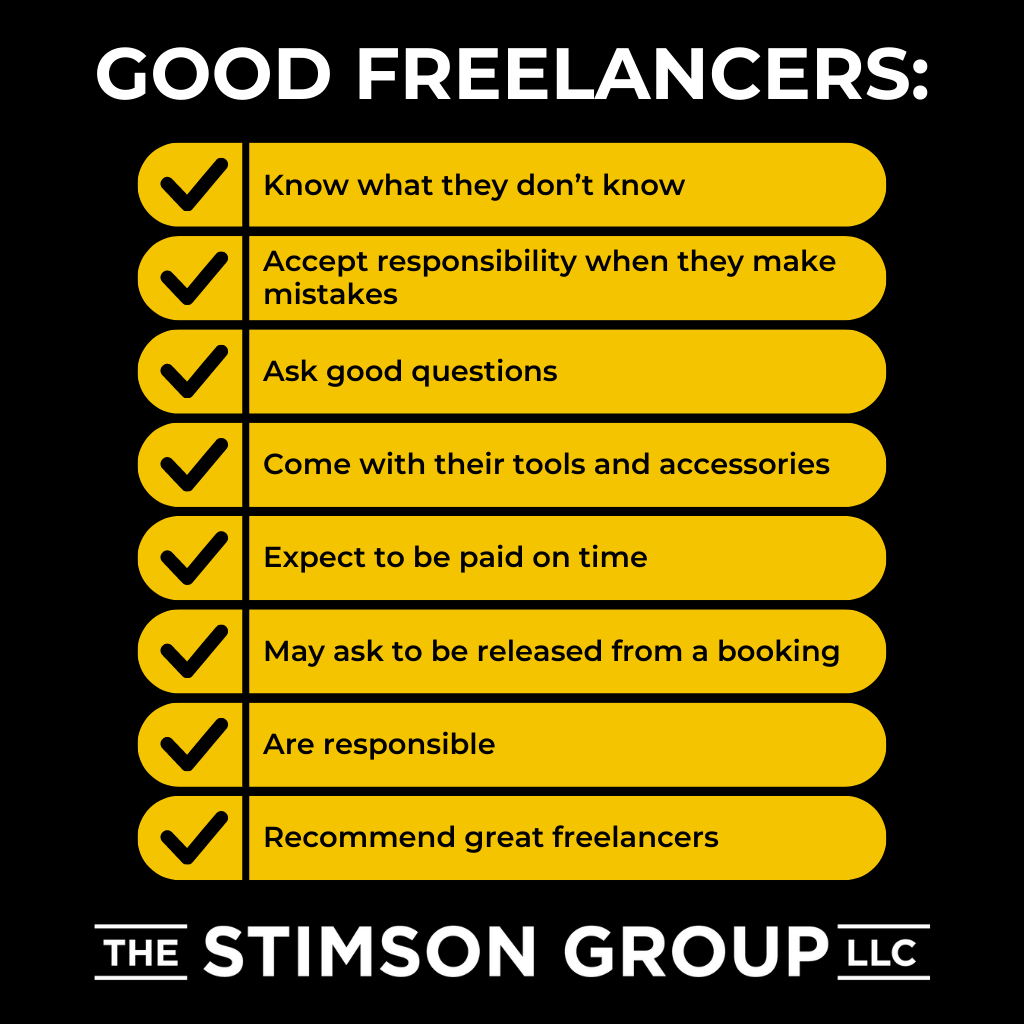
One of the most common questions owners ask these days is, “Where can I find great freelancers?”
Unemployment is low right now, and everybody who wants a job has one. On top of that, some owners have a smaller freelance pool than they did pre-pandemic because a lot of people left the industry. The freelancers they used to hire may not be available.
When business owners look for freelancers, they generally go to marketplaces, get referrals, and try people out. If they don’t succeed, many give a knee-jerk response: “There are no good freelancers left out there. I tried and I can’t find anybody.”
It’s frustrating when a company has to turn down clients because they can’t find people to work. Many simply give up. This is a huge deal. If you can’t source good freelancers, you’re not going to be scalable. You have to figure it out. If you don’t, you risk failure.
That’s why I’m writing about this topic. A lot of owners don’t know how to find good freelancers. Why? Because they don’t know what a good freelancer looks like.
This may be because they didn’t use freelancers much in the past or because they’re new to the process. Or maybe they’re just applying the wrong criteria.
When it comes to freelancers, the general metrics are the Great, the Good, and the Bad.

The Great Freelancer
Almost every owner thinks they need great freelancers. The truth is, you might only need good ones. To understand this, you first have to know what a great freelancer looks like.
Great freelancers aren’t looking for gigs.
A great freelancer already has all the work they need. Their business is referral-based.
Great freelancers might have a website and a LinkedIn profile, but their plates are probably full. You can’t find them because they don’t want to be found. To get to them, you need a referral — preferably two.
A great freelancer knows you’re desperate.
So, don’t start by asking them to commit to a job. If you do that, they may not return your next call. Instead, ask what they’re looking for in their next gig.
You need great freelancers more than they need you. Approach them that way. Ask, “What do you need to know about my business so that when I have an opportunity, we might get a chance to work together?”
Take the time to develop a relationship. If they’ve never heard of you, introduce yourself. Use the opportunity to understand what they’re looking for.
Great freelancers believe they’re only as good as their last job.
Because of this, they don’t want to take a job that’s probably going to fail.
Failure doesn’t just reflect on the freelancer’s current customer; it reflects on them, on everyone they worked with on the gig, and on everyone who hears about the gig.
Great freelancers want to do good work and help the customer succeed.
That’s why they’re interested in who you are, what you do, and how you do it. They want to contribute to your success.
You don’t have to sell yourself as a company that has everything figured out. You can sell yourself as a company that wants to figure things out. That means you need the knowledge the great freelancer has and you’re willing to pay for it.
Great freelancers will take the time to get to know your company.
Great freelancers want to make good companies better. They take pride in helping you, but to do this, they need to know you. And they won’t do it for free.
You’re going to have to pay a great freelancer for more than the gig you’re trying to fill. They’ll need to understand your systems and processes, and you’ll have to pay them for the time it takes to learn.
Great freelancers are not employee replacements.
What you ask your employees to do when you put them on a show is not what you ask a freelancer to do.
Your employees may put up with you having them prep cable, sit through meetings, and wear multiple hats. They’re okay with being both the show caller and the audio person.
Great freelancers won’t do that. They’re experts, and as experts, they expect to perform their expertise. When a 20-year veteran freelancer declines your request to help unload a truck, it says more about you than him.
Great freelancers are professionals who expect professionalism.
They can manage their own money, know how to travel on their own, and expect good information from you. If you struggle with any of these things, expect them to turn down your project.
Do You Really Need a Great Freelancer?
Great is great, but often, good is good enough.
In our line of work, we may need great freelancers sometimes, but we need good freelancers all the time. And good freelancers can often take the place of great freelancers if there are good people behind them doing a great job.
You may also need to consider good freelancers because you’re not quite deserving of great freelancers yet and may not be able to find great people to take on your jobs. But you can convince good freelancers.
Good freelancers will be more flexible about which jobs they choose to take on, because in order to be great, you first have to be good. If a great freelancer doesn’t think you’re ready for them yet, they’ll refer you to a good freelancer.
This is the only time a freelancer can acceptably refer someone who isn’t better than they are. I’ll explore that later.
The Good Freelancer
I’ve interviewed countless freelancers, and the first thing I do is determine whether they’re entry-level, good, or great.
We all know what an entry-level freelancer looks like: someone with a good attitude and strong potential who takes directions well.
Good freelancers have already passed the entry-level tests and are making their way in the field. They’re already making a living as freelancers. But how do you distinguish one?
Good freelancers know what they don’t know.
A good freelancer who thinks they’re a great freelancer is a problem — but a good freelancer who knows the difference between a good freelancer and a great freelancer is priceless.
Good freelancers know that just because they know their way around a console doesn’t mean they know how to use a console in every situation. They know just because they’ve mixed for a band doesn’t mean they can mix for any band.
Freelancers who know what they don’t know are refreshing to work with.
Good freelancers accept responsibility when they make mistakes.
A good freelancer will tell you what they learned from the mistake and why it won’t happen again. They have pride. They know they’re only as good as their last job.
They’re also more likely to be involved in jobs that don’t go perfectly, because they’re in the “good” category, not “great.” They’re surrounded by people who are also going to make mistakes.
Mistakes happen. They’re normal. The question is, how well does the freelancer handle them?
Good freelancers ask good questions.
Entry-level freelancers are afraid to ask questions. They don’t want to show how much they don’t know. But good freelancers are willing to show you they don’t know something because they know it’s more important to ask questions than screw up the job.
Good freelancers come with their tools and accessories.
They have extra baggage charges when they travel because of the kit they bring with them. You expect them to show up with the tools, and they expect to be paid.
Good freelancers expect to be paid on time.
They don’t expect to be haggled. If you haggle, you’re not living up to your end of the bargain, and you won’t see them again.
Good freelancers may ask to be released from a booking.
They’ll say something like, “If you’ll let me out of this job, I’ll make it up to you. I have an excellent opportunity to learn some things, and I’ll demonstrate them when I get back.”
If you turn them down, they’ll respect you and do the gig anyway. That’s what a good freelancer does.
Good freelancers are responsible.
A good freelancer will stay on a job until you send them home. Too many people out there are just trying to get done and get out. That’s not the industry we’re in.
We’re a team. Part of having a team is having a leader. The leader will recognize the person who cuts out before helping to load the truck and know it’s time to cut them from the team.
Good freelancers recommend great freelancers.
If a good freelancer isn’t available, they’ll recommend freelancers who are better than they are because they aren’t afraid of being shown up. They know if they recommend somebody who’s not as good and you’re not happy with the work, it’ll reflect poorly on them.

The Bad Freelancer
Here are the freelancers you want to avoid.
Bad freelancers blame other people for their mistakes.
Nobody wants to work with people who blame others. If you’re always hearing, “Somebody else did it, it’s not my fault,” you’re working with the wrong person.
Bad freelancers aren’t good at scheduling.
Our industry is a scheduled industry. Freelancers who repeatedly double-book, mismanage their schedule, and cancel bookings to take better ones without asking permission are not acceptable. It represents a lack of understanding of what their role in the industry is.
Bad freelancers submit invoices for rates you didn’t agree upon.
No matter the excuse, that’s bad business.
Bad freelancers will leave the job before the job is done.
They might say they assumed the job had an end time: “You said the gig ran from eight to five, so I booked another gig at seven.” Again, this communicates a lack of understanding of the industry.
Bad freelancers try to make themselves look better by recommending worse freelancers.
If they do this, burn their phone number.
My favorite question to ask a freelancer is “Who’s better than you?” The proof is in the pudding. If they recommend a freelancer who isn’t up to par, neither are they.
Final Thoughts
There are still freelancers out there. The better they are, the harder they are to find.
Don’t look for a great freelancer when you only need a good one. If you can find a good entry-level freelancer, they might also be worth a try.
Stay away from the bad freelancer. That’s just common sense.





Leave a Reply